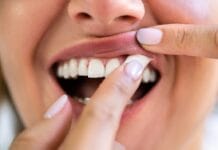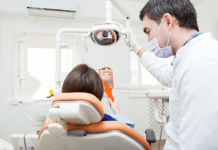The oral-systemic link in health care is being discussed more than ever. Our mouths are the opening to our entire body, and inflammation in the oral cavity can lead to inflammation throughout the body, including during pregnancy.
Many lifelong habits are created during pregnancy, and oral care should be one of them. From 2007 through 2009, approximately 56% of pregnant women in the United States did not see a dentist during their pregnancy1.
Dental treatment is both important and safe during pregnancy. Studies have shown a correlation between periodontal disease and premature births3. Visiting a dental professional can aid in the disruption of biofilm and decrease inflammation in the mouth.
On top of inflammation, pregnant women can suffer from other treatable oral lesions during pregnancy. Increased snacking and carbohydrate intake can increase dental caries, and morning sickness can lead to enamel erosion. The bacteria can be transferred to infants, putting them at higher risk for tooth caries and periodontal disease in their future.
During a woman’s first visit to the dentist, after confirmation of pregnancy, the patient should be educated about oral changes during pregnancy and proper biofilm removal. This should be followed by routine care, if applicable, and dental exam. According to American Academy of Periodontology (AAP), the European Federation of Periodontology (EFP), and the American Academy of Obstetricians and Gynecologists non-surgical periodontal therapy is recommended and safe for pregnant women and can help improve periodontal health2,4.
Non-surgical periodontal therapy consists of biofilm control and removal, scaling of supra- and subgingival calculus, root surface debridement, and adjunctive use of chemical agents. Therapeutic agents such as chlorhexidine and fluoride are safe during pregnancy1. Antibiotics such as Ciprofloxacin, Clarithromycin, Levofloxacin, Moxifloxacin should be avoided, and Tetracycline should never be used during pregnancy1.
When providing care for pregnant patients, you should start by assessing the patient with questions such as:
- How many weeks are you? When are you due?
- Do you have any questions or concerns about getting oral health care while you are pregnant?
- Have you made any changes to your diet?
- Are you feeling nauseous or vomiting frequently?
- Have you received prenatal care?
Medications−The review of medications the patient should be taking, as well as any medical conditions other than pregnancy, are important in determining the overall health of the patient. Nutritional counseling is also an important part of assessing pregnant patients. The frequency of food and beverage consumption can affect the caries risk of a patient; medicines containing sugar can also lead to dental caries.
Comfort−Providing oral care, even routine care, can be uncomfortable for a pregnant patient. It is important to keep the patient’s head higher than her feet and in a comfortable, semi-reclined position. Placing a small pillow under the patient’s right hip or having the patient turn slightly to the left can help avoid dizziness or nausea. Pregnant patients should never feel as though they need to postpone any dental treatment.
Medical issues−Oral health care is safe, important, and covered through most insurance plans. Dental radiographs (when necessary), pain medications, and local anesthetic are all safe to use during pregnancy1. Patients with co-morbid conditions that may affect the management of oral health (such as diabetes, hypertension, pulmonary or cardiac disease, blood disorders, etc.) should have a consultation with their physician prior to treatment.1 Any patient needing IV sedation or general anesthesia and the use of nitrous oxide in conjunction with local anesthetic should also consult their primary care physician.
Common oral health conditions during pregnancy
Pregnancy gingivitis− During pregnancy, an increase in the inflammatory response to dental biofilm can cause inflammation and bleeding of the gingiva. This condition typically peaks in the third trimester and effects 70% of pregnant women. Women with gingivitis prior to pregnancy are more prone to flare-ups during pregnancy.
Treatment: Having routine dental cleanings two to three times a year can help keep gingiva healthy. At home, rinsing with warm salt water rinses can help with irritation, in addition to proper brushing and interdental cleaning.
Pyogenic granuloma “pregnancy tumor” − This hyperplastic, highly vascularized, and often pedunculated lesion can be approximately 2 mm in diameter and located in the anterior gingiva. Approximately 5% of pregnant women appear with this form of lesion. These lesions are not cancerous, despite the name, and are an inflammatory response to oral pathogens that usually regress after pregnancy.
Treatment: Excision is rarely necessary but may be needed if there is severe pain, bleeding, or interference with mastication.
Periodontitis − This condition is the cause of untreated gingivitis. The bacterial toxins in biofilm cause an inflammatory response that creates a destructive infection to the gingiva and supporting structures of the teeth. Approximately 40% of pregnant women have some form of periodontal disease.2 Periodontitis can result in loose teeth, bone loss, and bacteremia.
Treatment: Nonsurgical periodontal therapy with or without anesthetic.
Dental caries − Pregnancy does not cause dental caries. Increased acidity in the mouth, as well as increased snacking of sugary foods and drinks, though, are contributing factors for increased dental caries.
Treatment: Patients should have dental treatment completed before delivery of the baby to decrease the risk of transferring bacteria to the baby. Delaying treatment may result in complex problems.2
Tooth erosion – The erosion of enamel usually occurs on the lingual surfaces of anterior maxillary teeth due to increased exposure to gastric acid from vomiting due to morning sickness, hyperemesis gravidarum, or reflux.
Treatment: To help eliminate acids in the mouth, it is important to neutralize the mouth. Rinsing with a baking soda and water solution (dissolve one teaspoon baking soda to one cup of water) may help decrease the acid and neutralize the mouth. Refrain from brushing for approximately 30 minutes following sickness.
Conclusion
Excellent home care is very important during pregnancy. Patients should be advised to brush twice daily with fluoridated toothpaste, clean interdental surfaces once daily, and use an alcohol-free mouth rinse. Healthy snacks are encouraged and avoid foods and beverages with added sugar.
Morning sickness or nausea is a side effect of pregnancy that can cause erosion on the enamel of teeth. If the patient is suffering from morning sickness, she should not brush for a minimum of 30 minutes after vomiting. She should swish with a teaspoon of baking soda in one cup of water to help neutralize the mouth.
Patients who require restorative treatment should have the treatment completed before delivery, leaving carious lesions untreated can increase the risk of dental caries for the child.
Before you leave, check out the Today’s RDH self-study CE courses. All courses are peer-reviewed and non-sponsored to focus solely on pure education. Click here now.
Listen to the Today’s RDH Dental Hygiene Podcast Below:
References
- Oral Health Care During Pregnancy: Practice Guidance for Maryland’s Prenatal and Dental Providers. Oral Health Care During Pregnancy Steering Committee. (2018). Baltimore, MD: Maryland Department of Health, Office of Oral Health. www.OralHealth4BetterHealth.com
- Oral health care during pregnancy and through the lifespan. Committee Opinion No. 569. American College of Obstetricians and Gynecologists. Obstet Gynecol 2013;122:417–22. Retrieved from https://www.acog.org/Clinical-Guidance-and-Publications/Committee-Opinions/Committee-on-Health-Care-for-Underserved-Women/Oral-Health-Care-During-Pregnancy-and-Through-the-Lifespan?IsMobileSet=false
- Bobetsis, Y.A., Barros, S.P., Offenbacher, S. Exploring the relationship between periodontal disease and pregnancy complications. Journal of the American Dental Association. 2006: vol. 137. Retrieved from https://jada.ada.org/article/S0002-8177(14)62726-4/pdf
- Expectant Mothers’ Periodontal Health Vital to Health of Her Baby. American Academy of Periodontology. Retrieved from https://perio.org/consumer/AAP_EFP_Pregnancy











